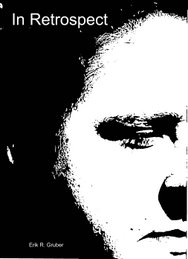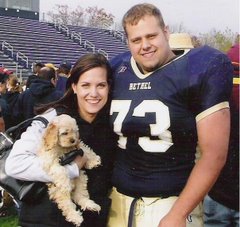It was great to read everyone’s comments on yesterday’s post. I love hearing the personal stories on this issue, and look forward to the ongoing discussion.
Cassel, thanks for the perspective on Biblical interpretation. It’s nice to have the thoughts of an aspiring theologian who is studying the Bible in a scholarly way.
Mr. Antagonist, you’re correct to point out that establishing the existence of a higher power doesn’t prove the existence of an intervening God. I find that this is the hardest leap to make, and don’t claim to have it figured out just yet. I probably never will…
Picking up where we left off yesterday:
The second question that the non-theist can’t answer regards the origins of human life. Human beings are extraordinarily complex entities, and the odds of such a complex organism just “appearing” are astronomical.
So where did we come from?
The naturalist will try to explain this problem away with the “Neo-Darwinian Synthesis.” This is the theory that during the formation of the earth there was a “primeval stew” which consisted of the numerous simple compounds that are essential to life. Through light flashes and other energy sources these compounds randomly blended to form the enzymes needed for life to form and evolve.
Fred Hoyle and N.C. Wickramasinghe, two renowned astronomers, did an in-depth study into this theory and found that the odds of events happening the way Neo-Darwinists say they did is 1 in 10^40,000. This number, they claim, is “exceedingly minute, to a point where it is insensibly different from zero.” Perfect conditions, chance events, flawless timing. The numbers say this is nearly impossible. So who’s being illogical?
As a result of these experiments, Hoyle and Wickramasinghe concluded that there must be a super intelligence, something ordering the universe.
Next, take a look at the human body. Its mechanics are so incredibly perfect that I think it would be a logical leap to say it formed and evolved randomly. L. Stafford Betty and Bruce Cordell expound upon this in an essay titled “The Anthropic Teleological Argument.” I won’t delve too far into the argument here (Google it if you’re interested), but their hypothesis asserted that human life is far too complex to have come into existence by chance, and our creation was ordered by a “Grand Universal Theory.” In the words of Voltaire: “If a watch proves the existence of a watchmaker but the universe does not prove the existence of a great Architect, then I consent to be called a fool.” There must have been some super-intelligent, grand designer behind it all. What else explains human life?
Our bodies are extremely fickle, and cannot sustain in drastic conditions. If the earth was colder or warmer, if the atmosphere was made of different compounds, if there was less or more water, humans couldn’t survive. Earth was given the perfect parameters for life to develop. How?
Betty and Cordell note that it is interesting that the “God of the gaps” theory has been turned around. It seems, from the mathematical odds stacked against naturalistic theories on the formation of life, that it is actually “science of the gaps.” We have discussed this before, but to reiterate: Christians are often accused of starting at a predetermined conclusion and molding evidence to fit said conclusion (a crime we are admittedly often guilty of.) But it would appear that in this instance, in studies on the origins of human life (a highly scientific field), scientists have started with the conclusion that there is no Creator, have ignored mountains of mathematical probability and evidence, and have manipulated science to confirm their theories. They have turned their backs on the objectivism which they claim to so rigorously uphold.
Think about the mathematical and logical stretch it takes to believe that life formed and evolved through natural forces. To do so is to believe in a virtually impossible event, and then to believe that this virtually impossible event happened over and over again until the result was a perfectly formed creation capable of advanced thought and reasoning.
Wow.
Call me crazy (or illogical), but I’ll stick with a Creator. Part three on Monday…
Thanks for reading.
Subscribe to:
Post Comments (Atom)


















10 comments:
Great post Groobs! Another question that your writing spurred on in me is this: If we have been able to evolve into such complex creatures through the last billion years, what will happen the next billion years? Will we grow wings to fly or develope x-ray vision?
Really I am not trying to be funny. Who would have believed when we started as fish or some organism that we would evolve into the complex human race that we are today? Nobody would believe that and it is because it never happened. We were created this way.
Why is it hard to believe that we were created? Is it wrong to think that way, what is it that makes scientist so apt to disagree?
What do most people think is crazier? That we were created or evolved from nothing?
If you really look at the entire realm of things you really can't prove either way. I know I am stubborn and it is hard for me to make sense out of the orgins of life if we weren't created.
I think that somewhere a long the way someone did not want to beleive that we were created and tried to find another way to prove our existance. Evolution has snow balled and it will never be convincing enough for everyone to believe, but then again will creation?
I really like this post Erik! It's straight to the point and squashes my confidence in most scientific explainations for life on earth. The discussion is helping with the "teeter-totter" I admitted the other day. I know that this whole series is a very difficult task, but you're pretty convincing so far.
Something to think about...I bet that there are at least 10^40,000 planets in the universe. Statistically there is bound to be a planet like earth, or probably more in the universe.
I'll admit, human life is a bit less likely to randomly form...especially on that one in 10^40,000 planets. I wonder though, could humans form from the elements that earth possesses? I'm not sure...just asking to see if anyone knows. If it is, I wonder what the odds are that over the course of billions of years the right molecules got put together. Even if they did form a walking mammal, how did they know enough to do things like interact with each other and reproduce?
I'm not saying this because I think this is how things have gone down, just random thoughts that came up while I was reading this....I think my mind is spinning.
Anyway, keep up the good work Grubes!
If time is infinite (without beginning or end), then if there was a 1 in 10^40,000 chance that human life would occur, wouldn't it have to happen indefinitely? It would just happen on given day out of 10^40,000 days. Yeah that was kinda battin for the other side...not in that way, but anyways... you know what I mean
Great post grub daddy. I aggree with you 100%. I don't really have much to say today, so i'll just wait till monday to see what kind of wisdom you spill on us.
Cassel, I was thinking the exact same thing while reading the post. If the universe is infinite then a 1 in 1^40,000 really is that big of a deal, not that i believe it happened that way, but it is an argument from the other side of the spectrum.
All right you guys all have a great weekend and we'll see ya back here on Monday...
There are so many more "holes" If all species have been evolving for millions and millions of years where are all the fossils of the transition species? I'll answer: There is none. there has never been even one single transitional species discovered! All the half men half monkey skeletons they claim to have aren't real either. What those are is small bone fragments that are a tiny percent of the skeleton and from them they build a whole skeleton to fit what they "believe" it would have looked like. Anyway, that is my biggest flaw that I cannot understand how anyone could look past, but oh well.
Anyway, a quick answer to anonymous' question. I believe the most recent estimates are that there are something like 10 trillion planetary systems, that is 10^13. We are talking odds of life coming from nothing odds of 10^40,000. That is 10 followed by 40,000 zeros! When you type that into this exponent calculator it says the answer is infinity!
http://www.webwinder.com/wwhtmbin/jexpont.html
There is no reason such a number would ever even be needed!
Also, yes scientist have been trying to create the goo of life for a number of years now in a perfect lab setting knowing everything that we know today and have not even come close. What would ever make us think it could be done at random? Also, check out the law of biogenisis which states that life cannot arise out of non-living matter.
Pazzlee-totter,
Thanks for adding to Grubzwazizzle-zee's post. When considering what you added, it makes it much clearer and easier to understand.
Truth is, while on earth we will never know what is absolutely true. However, for me there is simply too much pointing towards the idea of a "maker/creator" to believe the other way.
I know, atleast speaking for myself, that most people who grew up in a Christian environment will be slightly bias on this issue. I do know that I have thought about this a great deal, and it always helps to look again... especially when both sides are laid out.
Such a great discussion.
Hmmm-hmmm-uhhhh-rrrrrr-so much to say-rrrhhhhggggg-don't know where to begin...
I'm going to begin saying something that I know is a HUGE cop out. In order to confront what you are saying in your post, I don't have the literature at hand, but I do know it exists. I say this only to remind you Grubes of something you said yourself: debating a topic that requires the use of secondary sources is almost impossible.
The figures that are used, while no doubt genuine, need to be placed in a proper context, one that can be shared by all. Late Night, that intelligent gentleman, provided a good example of how potential circumstances surrounding the numbers can greatly change what they mean. Even if his particular criticism doesn't hold up (which I think it might), the potential is still illustrated.
The point I'm making is this: even though I can't challenge what you're saying, I have confidence that someone could. Ughhhhh, I'm such a ass.
(This is really more of a side note) Science can turn into a religion at times, yes. However, science is not the enemy of reason. It rewards change. When Einstein came up with his theory of relativity, the great minds of his day gathered before a painting of Sir Isaac Newton and said "We're sorry Sir Isaac, we have improved upon your universe." (wording might be different) If a scientist, Christian or otherwise, found irrefutable proof that an architect was necessary, he'd recieve the Nobel Prize for Physics that very year.
Now, I'm not being a stick in the mud. I've heard some great debates on this very subject that included the best of the best from each side. I've gotta tell ya, the verdict is not in my friends.
Off the top of my head...one thing I can add is that this universe is a size that goes beyond the english language. The question should never be aimed at Earth, it should be aimed at our entire universe. I'm not sure if this is adding anything, but hey...
P Corcs, you probably knew this was coming...with all due respect, I just flat out disagree with what you're saying about evolution. With regards to "missing links"...I can't imagine you'd find scientists without a stated religious agenda that would support your arguments. I could be wrong. For me personally, there just comes a time when I say, "Sorry, but I challenge that a debate even exists." The vast majority of those in a authoritative position agree with evolution and...well...that's good enough for me.
I will say this about science, bringing it back to an architect to the universe... in the last few hundred years, the general movement for understanding has been from religion to science. This is not an insult to religion, only to ignorant practices of religion 100s of years ago. The idea of an architect was well established. The new ideas that were introduced were the possiblity of no architect, or at least a redefining of that dude's role. Because these ideas came later, I think scientists give off the impression that they don't believe in a God like figure. However, I don't think that's true. I don't think anyone in the spotlight has claimed to find evidence that there is no grand master, but the goal is to at least present the possiblity. How would that work? ect. You could be right to disagree, these are simply my impressions.
Also, I think the Big Bang, completely works with a master designer.
WAHHHHHH, I might have to post a second time.
I'm so sorry to those who actually check my blog. I have discovered that writing comments is much quicker that introducing a post and filling out grad school stuff has dominated my free time lately.
Wow, I just re-read my post and realized that at one point, it sounds like I'm suggesting religion to be the enemy of reason. I'M NOT.
Mr Antagonist, I thank you for your disagreement. Although I do not have time right now to thoroughly defend my position and like you said bringing in outside sources isn't necessary, I will just make a couple comments.
Scientists use faith to believe in evolution because it is the most logical explanation in their minds. When you are searching for a scientific explanation for our world, not everyone wants to say hey, we were just created, we don't need to understand it, so I'll just sit on the couch and watch TV (not saying that is what christians do necessarily). But I think that is an awful way to look at it even if that is what you believe.
But, what I'm trying to explain is that there are missing links. If we had all the transitional species, it wouldn't be the "theory of evolution" it would be the "law of evolution". Scientists have been working to prove evolution for the last hundred years and yet it is still just a "theory". And it is the best theory we have scientifically right now, that is why many of the big minds hold to it. Like you, a lot of people want some kind of proof before they can believe in something and that is fair. I tend to want proof and we all should. What I will argue is that what we know about evolution and what is theorized right now takes as much faith as it does for me to believe in a Christian God that created everything.
Again, thank you for your response, I hope you have more. It just grows us as human beings especially when we can disagree with open minds in non-hostile environment. In fact I hope you have more disputes with what I think since you are the major voice of the "other side" in these discussions. It is wonderful that everyone can read our thoughts and reach their own conclusioins.
PS. I didn't mean to encompass all scientists that they have a "religious agenda." I'm sure most of them are honestly seeking truth and in there minds holding to the most logical explanation they can understand.
I do however believe there are some out there with an agenda pushing evolution because of there atheist beliefs. Just like some christians try to push there agendas.
Post a Comment